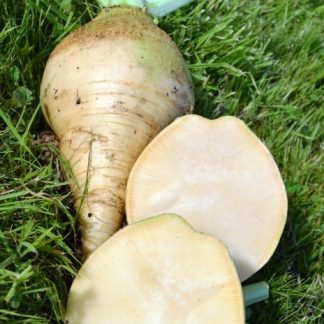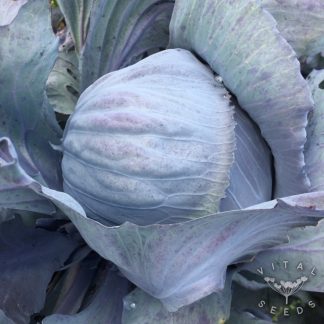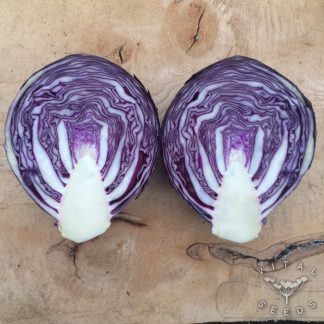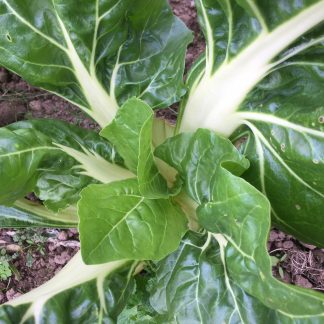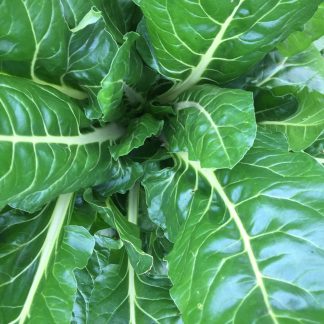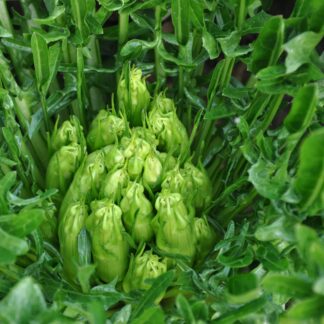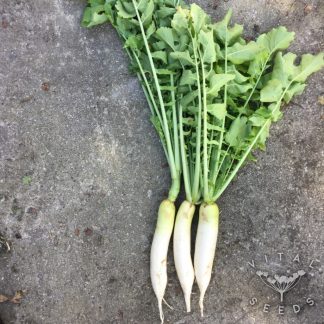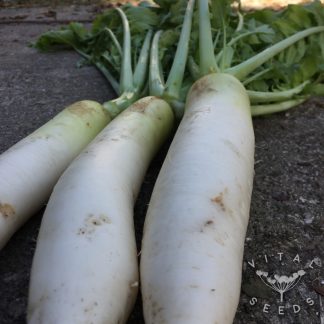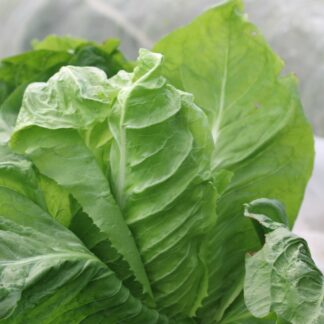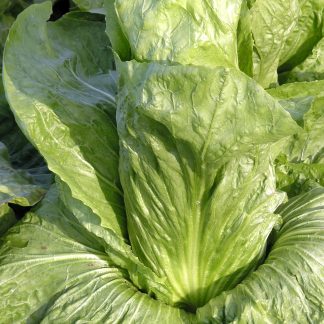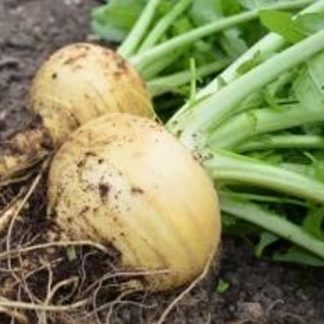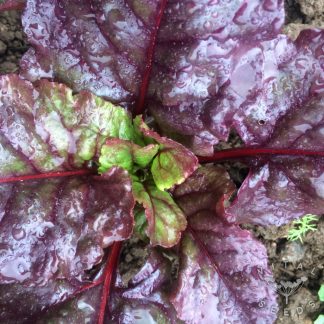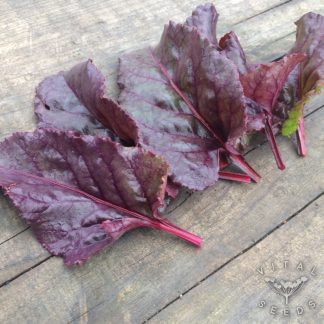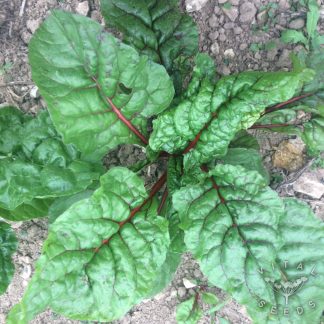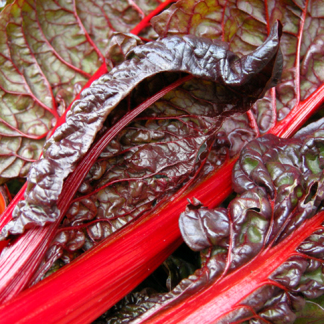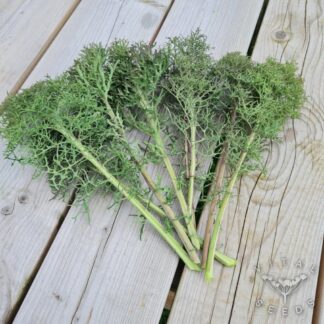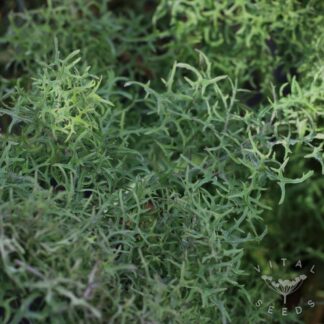Winter veg
Showing 49–60 of 62 results
-

Swede – Willhelmsburger (Organic)
£1.60 Add to basketSwede – Willhelmsburger (Organic)
A well-formed, firm-fleshed and smooth-skinned swede, refined in taste and with good keeping qualities. Swede is a very valuable winter vegetable and easy to grow.
Wilhelmsburger is a German variety from 1935 bred for culinary use. Ronja’s favourite recipe for swede is a bake with a creamy sauce and goats cheese. It will also make a great addition in stews or just roasted.
(Approximate seed count – 275) £1.60
£1.60 -


Cabbage – Langedijk Red (Organic)
£2.60 Add to basketCabbage – Langedijk Red (Organic)
Forms dense heads of a good size which stand well in the field and also do well in storage. This improved variety is particularly suited for storage and has good taste. It also makes a very fine sauerkraut, turning bright pink during the fermentation with the addition of salt. Red cabbage can be used as a litmus test for acidity turning blue in more alkaline conditions.
Guest description by our friend Dan from Chagfood CSA!
(Approximate seed count – 100) £2.60
£2.60 -


Chard – White (Organic)
£2.30 Read moreChard – White (Organic)
A classic variety with glossy dark green leaves and thick white stems. If you need a leafy vegetable that ‘just grows’ Swiss Chard is a garden essential. From two sowings, one in the Spring and one in the Autumn, you can have chard almost all year round. In Fred’s words “Chard is just always there, even if you don’t want it, it’s still there”.
This variety is robust, vigorous and very productive. You can use the stem and the leaf separately as they have different cooking qualities. Ronja’s favourite recipe is with the whole plant. Sauté onions in some oil with a bit of chilli and the Swiss chard, add some cooked white butter beans, serve with cheese on top – just delicious!
(Approximate seed count – 200) £2.30
£2.30 -


Chicory – Puntarelle (SM4.33) (Organic)
£2.50 Add to basketChicory – Puntarelle (SM4.33) (Organic)
An interesting chicory variety grown for its hollow bolting shoots. Unlike other chicory varieties which are grown for their leaves, Puntarelle is grown for its flowering shoots. The young shoots form a ‘head’ at the base of plant and are julienned into thin strips which are then soaked in cold water to removed some of their bitterness. In the water they twist and curl into elegant crisp and crunchy shapes which are then served with a punchy dressing to make a lovely late autumn salad.
Shoots usually appear between mid-October and November.
(Approximate seed count – 100) £2.50
£2.50 -


Chard – Magenta Sunset (Organic)
£2.30 Add to basketChard – Magenta Sunset (Organic)
This chard makes a stunning leafy green with stems of orange and magenta . ‘Magenta Sunset’ has its name from the showy coloration that ranges from bright pink over crimson to deep burgundy contrasting the dark green leaves typically growing to a height of 30-60 cm. It is versatile that adds ornamental and culinary value to gardens and container growing. It can be harvested throughout the growing season and makes a delicious and nutritious addition to salads, soups, and stir-fries.
Our favourite way of eating it is as a side dish steamed with melted butter and a pinch of pepper and salt.
(Approximate seed count – 200) £2.30
£2.30 -


Daikon Radish (Organic)
£2.20 Read moreDaikon Radish (Organic)
This is a great variety of Daikon radish, also known as Mooli, for sowing in July and August producing long bright white roots which are crunchy and delicious. Its roots can grow huge – up to 3 inches in diameter! It is not too hot and stays very sweet and crunchy. It’s best left in the ground until needed. We have some disagreement on the best way to eat daikons; Fred likes to eat it raw and Ronja’s favourite way is to eat it fermented or pickled. Try both and see what works best for you!
(Approximate seed count – 150) £2.20
£2.20 -


Chicory – Pain De Sucre (Organic)
£1.60 Add to basketChicory – Pain De Sucre (Organic)
Mild tasting green leaves that form dense, conical heads; alternative to winter lettuce.. This is a more mild tasting chicory that is a superb substitute for lettuce in the winter. Indeed, this is a common practice in several rural parts of France and no doubt elsewhere, too. It can produce very large heads, with a tender green exterior and golden yellow hearts that have a real sweetness to them, hence the name!
(Approximate seed count – 500) £1.60
£1.60 -

Turnip – Goldana (Organic)
£1.65 Add to basketTurnip – Goldana (Organic)
An improved version of the Golden Ball turnip, creamy-yellow flesh, suited for spring and autumn sowing. Turnips are very traditional vegetables which, unlike most of the vegetables we eat, are native to Europe. For some reason they are not as popular as they used to be.
Goldana is a tasty maincrop variety with a uniform golden round shape, probably one of the mildest and sweetest varieties that you can find. It is quick to grow and doesn’t need much attention. “Get them in, get them out” is what Fred says. He likes them in soups or stews but they can also be roasted, mashed or grated into a slaw or salad.
(Approximate seed count – 400) £1.65
£1.65 -


Chicory – Radicchio Treviso Late (SM4.75 – Forcing) (Organic)
£2.50 Add to basketChicory – Radicchio Treviso Late (SM4.75 – Forcing) (Organic)
A forcing chicory from Treviso for delicious winter eating. This variety of chicory has been bred for forcing through the winter months (Tardivo means late in Italian), and produces totally delicious ‘chicons’
To force chicory the plants should be left untouched in the field until winter time. When you wish to force them, pull up however many plants you need and replant the roots into a moist medium such as sand or spent compost. The plants then need to kept in total darkness for a few weeks and then beautiful chicons will grow from the roots.
They are generally eaten cooked in pastas and other dishes and were the first Italian vegetable to gain IGP, a European protected status for special food products specific to a place of origin.
(Approximate seed count – 100) £2.50
£2.50 -


Beetroot – Bull’s Blood (Organic)
£2.30 Read moreBeetroot – Bull’s Blood (Organic)
A variety with extremely dark red leaves, usually grown as a salad leaf. The leaves are exceptionally dark red, almost purple colour and very tender and sweet, especially as baby-leaf. They can be cut up to 4-5 times and will grow back.
(Approximate seed count – 200) £2.30
£2.30 -


Chard – Rhubarb (Organic)
£2.30 Read moreChard – Rhubarb (Organic)
A very striking variety of chard with dark green leaves and bright red stalks. This ornamental looking chard is worth just growing for its beauty! It can be used like any other chard or spinach.
(Approximate seed count – 200) £2.30
£2.30 -


Kale – Bear Necessities (Organic)
Price range: £2.10 through £4.00 Add to basket This product has multiple variants. The options may be chosen on the product pageKale – Bear Necessities (Organic)
An unusual ultra-frilly Red-Russian type. Bear Necessities has leaves unlike any other kale as it was bred from a cross between a mizuna and a kale. It’s ultra frilly leaves lend themselves to salads when young and are great cooked when larger.
The leaves have a high volume and surface area which means they stir-fry particularly well, easily getting coated in delicious flavours and holding their shape.
 Price range: £2.10 through £4.00
Price range: £2.10 through £4.00
Showing 49–60 of 62 results
